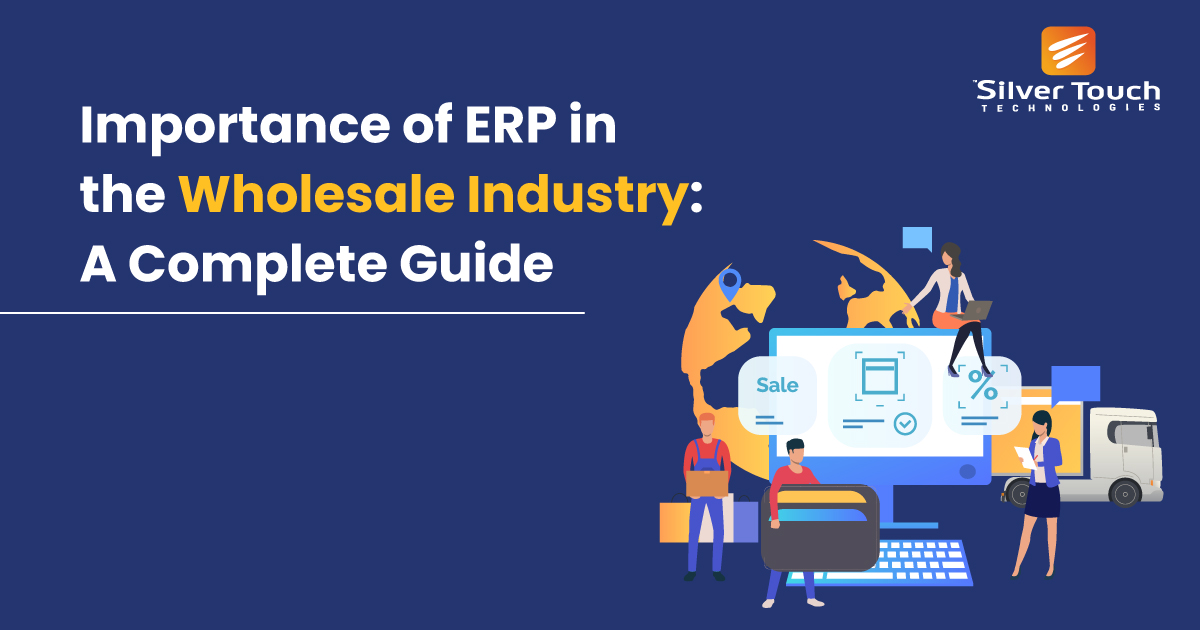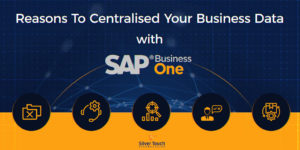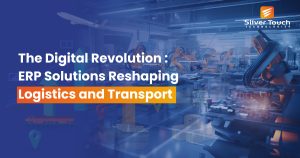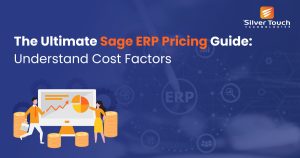With the emergence of Industry 4.0, manufacturers and distributors are integrating new technologies into their operations. New age concepts such as IoT, AI, machine learning are leading path-breaking revelations in the data space. This is necessitating manufacturers to obtain and integrate actionable insights into production processes, logistics, inventory management, and supply chain management. Furthermore, there are strict industry standards that manufacturing firms must comply with.
To tackle these challenges and stay profitable in the long run, every manufacturing firm is looking for manufacturing ERP software packed with functionalities that will boost their business processes.
So how does a manufacturing ERP benefit the industry? – To understand that, let’s first see how a whole distribution network operates.
What is Wholesale Distribution or Wholesale?
Wholesalers are an important link in the supply chain. They are responsible for selling and distributing goods at large in bulk to retailers, other distributors, or directly to end customers. They act as an intermediary between manufacturers and retailers or end customers.
So how does the wholesale model work? – The wholesalers procure large volumes of goods from manufacturers or other suppliers and keep them in warehouses. They subsequently sell these goods in lesser amounts to merchants, who eventually pass them along to final consumers.
Wholesale distributors may also sell directly to end customers, mainly when customers are businesses or other organisations. Therefore, they are actively involved in B2B business. They deal with various goods ranging from food and beverage, electronics, industrial equipment, clothing and apparel, etc.
ERP for Wholesale Distribution Industry: What is it?
ERP for wholesale and distribution is an intelligent software solution that simplifies and streamlines various functions across the industry. A few of the primary activities of this industry include logistics, inventory management, customer handling and financial management.
Although these tasks were performed manually for several years, as competition and data volume continue to increase, the chances of errors are increasingly high. Therefore, today wholesalers need a solution that can improve accuracy and business processes.
An ERP software for wholesale and distribution performs all these tasks and more with improved precision. An ERP system designed for the wholesale and distribution industry includes functionalities like inventory management, demand forecasting, order processing, shipping and logistics management, customer management, accounting and financial management, procurement and supply chain management, and reporting and analytics.
In short, an ERP system tailored to the wholesale and distribution industry is a vital tool for managing the complex operations of these businesses. It helps to simplify workflows, minimise errors, and enhance efficiency and profitability.
You may Also Like: ERP for Retail Industry: Comprehensive Guide
Significance of ERP for Wholesale Distribution Industry
The wholesale industry is a complex model, and as you keep on adding factors, it becomes hard to handle. Hence, an ERP is necessaryfor wholesalers and can benefit them in the following ways.
Improves Efficiency
ERPs are a centralised platform through which wholesalers can handle all business processes with ease. As it reduces laborious, repetitive tasks, it saves time and effort. Therefore the overall efficiency of the team increases.
Enhances Customer Handling
Wholesalers often deal with large volumes of B2B clients. An ERP creates a central repository of customer data. Hence, you have a clear view of all your clients, including order details, outstanding bills, etc.
Accelerates Decision-Making
Most modern ERPs are cloud-based and can be accessed from any device. Simply put, the data is stored and managed on remote servers hosted on the internet rather than on personal computers. One example of a cloud-based product is Google Docs or Google Sheets. Since the team can access crucial data at any time from anywhere, an ERP accelerates decision-making.
Better Supply Chain Management
Supply chain bottlenecks are an unavoidable hiccup for wholesale companies, especially those procuring goods from manufacturers. An ERP allows wholesalers to manage the entire supply chain, from purchasing to shipping, under one platform. It also reduces costs and optimises operations.
Improves Accuracy
Previously, most of the tasks were performed manually, such as data entry, discount calculation etc. An intelligent ERP comes with various functionalities. Therefore, it eliminates manual tasks and the chances of human errors.
Better Inventory Management
Another task that has room for error and can accumulate enormous losses for the organisation is stock keeping or inventory management. An ERP ensures that the stock is calculated with optimum accuracy. Businesses can also access order history, customer information, purchase dates, etc.
This brings us to the challenges of an ERP in this industry.
Challenges of an ERP in the Wholesale and Distribution Industry Different
If you are a wholesaler and have not adopted an ERP, then you are losing out in a competitive landscape. However, the ERP for wholesale businesses has its own drawbacks. These challenges may look similar:
Integration
To ensure heightened customer experience, integrating an ERP for wholesale with CRM software solutions or a warehouse management system (WMS) is imperative. However, the lack of a flexible system can pose significant challenges.
User Adoption
Employees may not readily accept a new change, especially if it is technical in nature. Hence, it can defeat the purpose of implementing an ERP in the business. Hence a comprehensive training plan is a must when adopting an ERP.
Cost
Implementing an ERP is a pricey affair for small and mid-sized wholesalers. Therefore they have to carefully evaluate the pros and cons, alongside the functionalities of the ERP and evaluate if those will serve the business in the long run.
Customisation
Customisation can be a vital part of implementing an ERP. However, it is costly and time-consuming. Hence organisations with limited resources can find it difficult to opt for out-of-the-box plug-ins.
Cybersecurity
Wholesalers and distributors are readily adopting cloud-based ERPs. Although it is a positive step towards digital transformation, the growing concern of data theft and lack of cyber security continues. Businesses must ensure that the ERP software is safe and follows all the safety protocols and standards to protect vulnerable data.
Data Management
ERPs are supposed to streamline data management. However, if you are trying to do it using legacy systems (old technologies) or handling the data manually, it can lead to big mistakes. Hence, choosing robust ERPs is the only solution.
Different Processes of Wholesale and Distribution Industry: How ERP Can Help?
Wholesale and distribution management is an umbrella term for several processes, as listed below. Each of these tasks has its significance and plays a key role in the wholesale management pipeline. They are often interlinked, and therefore one cannot succeed without the other. An ERP can largely help the organisation in managing these processes.
Procurement
Wholesalers have to procure the goods from the producers. ERP serves as a centralised platform where you get a comprehensive view of all your suppliers and vendors. You can track orders and manage vendor relations.
Inventory Management
Inventory is the main component in wholesale management. An ERP software solution monitors the inventory and alerts you about overstocking or understocking. It also tells you when you have reached the safety threshold and it is time to order stock. It enables the wholesaler to manage demand fluctuations without bottlenecks.
Order Processing
Features like automatic order entry, order confirmation, and order tracking come in handy when you have to automate tedious tasks. The ERP helps you reorder goods automatically based on predetermined safety stock levels and other instructions.
Reporting and Analytics
ERP software solutions help wholesalers get a deeper understanding of their company and customer data. The system uses advanced analysis tools to fetch actionable insights on customer preferences, buying patterns, market trends, sales performances and inventory levels.
Customer Management
An intelligent ERP allows your to access real-time data that developes a deep understanding about your customer requirements and beahviours. These are highly valuable information for the company, as now you can make direct recommendations to your customers and boost your sales potential.
How does an ERP for wholesale Industry work?
An ERP for wholesale and distribution can solve several challenges if launched correctly. It involves several steps that ensure its efficiency. Here is a breakdown of the process:
Collect Data
The ERP will collect all sorts of data available in the organisation, including but not limited to inventory level, customer information, financial transaction, purchase and order inventory. It is the first step.
Process Data
Once the data is collected, various tools built-in into the ERP software solution will be used to process the data. Data processing will give rise to actionable insights and information.
Integrate, Connect and Communicate with Others
For improved efficacy of the ERP and data accuracy, the system will also collect data from other departments of the organisation, like sales, accounts, etc. The employees can access real-time data from a centralised platform. ERP systems are known to improve the connection between all departments of an organisation, as they have access to updated and real-time data. However, ERP for the manufacturing industry also enables information sharing with third parties like suppliers, vendors, and customers. It goes a long way in instilling trust among different business partners.
Automate Processes
The ERP will automate several laborious tasks and increase the team’s overall efficiency and speed. Automation increases the organisation’s overall efficiency and allows it to scale its operations. More manufacturing means greater capacity to meet customer demand and earn profit through large sales.
Customise Per Need
One of the benefits of an ERP is that you can customise it as required. You can add plug-ins, special features, and tools to the ERP software solution based on your business needs. The customised system can handle complex pricing and discount structures, manage multi-level product configurations, track inventory across multiple warehouses, and more.
Analyse and Report
The ERP system offers up-to-date information and analysis of critical business metrics, including financials, inventory levels, and sales performance. This real-time data can be leveraged to create personalised reports and dashboards, empowering management to make informed and data-driven decisions.
Features of ERP Wholesale Distribution
When choosing an ERP solution for the wholesale and distribution industry, it is important to assess the software and determine that it has industry-specific qualities.
Order Management
An ERP for a wholesale business should be able to manage orders, including managing customer accounts, invoicing, tracking orders, analysing sales performance, and identifying purchasing patterns.
Inventory Management
The ERP should also assist the wholesalers in managing and monitoring inventory. It can follow any stock-keeping method, such as LIFO or FIFO. Additionally, it can help regulate inventory levels once they drop below a determined threshold.
Supply Chain Management
Supply chain management is another vital activity of wholesalers, and the ERP should be equipped to assist in the same. Furthermore, it must also facilitate vendor relationship management and scrutinise supplier performance.
Financial Management
Wholesalers and distributors often deal with goods worth hundreds and thousands of dollars. Often a large sum of money remains outstanding. Therefore, an ERP for wholesalers and distributors should be able to assist in financial management. It also includes automating invoices, bills, and payments. Finally, it must accurately report and analyse financial data.
Report & Analytics
The last and final feature is analysing all the data and providing accurate reports. The ERP can also have a data visualisation feature, where the insights will be displayed using various tools and charts for better understanding. Lastly, the ERP should provide real-time updates to the organisation about inventory levels and order statuses, amongst other factors.
How to Implement an ERP Wholesale and Distribution?
ERP implementation can be done in a few easy steps, simply identify the business needs and get to the action. If only it was that simple. Investing in a comprehensive ERP software solution can be a cost-intensive decision, especially for start-ups and SMEs. The process of launching a wholesale and distribution ERP is broken down into seven steps below.
Identify and Define your Requirements
Start by asking why you are considering an ERP for the wholesale business. The answers lie in the short and long-term goals of your business. You also have to take stakeholders into account. The ongoing market trends and external opportunities will also contribute to the decision. Define the goals you want to achieve through the ERP. It will help determine how the purchase can contribute to your long-term success.
Make a Blueprint
To ensure that the launch goes seamlessly, make a blueprint. It should involve all the necessary steps, including searching for vendors and customising. You can also add deadlines and milestones to make the plan more concrete. Deadlines will give the team a sense of direction.
Find the Correct ERP Vendor
The success of the ERP will also depend on vendor expertise. Create a list of all vendors who meet your criteria and compare them across several parameters. Critical comparison will help you determine and finalise the most suitable vendor. Identify the vendors who fit well in your budget and make a wise choice.
Prepare the Data
After you have finalised the ERP vendor, prepare the data you want to feed into the ERP solution. You must import it to the new system or integrate the old and unique solutions if it is in legacy software. You must ensure the data is clean, accurate and up to date. You may have to perform data mapping in some cases.
Customise the ERP
Although most ERPs offer 360-degree solutions, you may require some added functionalities. The good news is modern ERPS are customisable. Hence you can ask your vendor for specific plug-ins.
Train your Team
Adopting new technology is challenging and often comes with resistance. Prepare your team or the managers beforehand to ensure that the new system is used optimally. You can also arrange training sessions for the team. While selecting the vendor, you can check if they offer training. Since they will be well-versed in the customisations, they can pass on accurate information.
Test and Launch
The final step is to test the ERP software solution and ensure it is running as intended. It is a crucial step since you can solve all discrepancies before it is too late. Once it delivers successful results, you are ready to launch.
What are the Capabilities of a Modern ERP For the Evolving Wholesale and Distribution Industry?
Before probing into the benefits or advantages of an ERP for the wholesale and distribution industry, one must explore the factors which make an ERP an indispensable part of any modern wholesale organisation. As technology is evolving and new-age tools are added to ERP software solutions, they are becoming more robust than before. Five such capabilities of a modern wholesale and distribution ERP are:
Internet of Things (IoT)
The Internet of things, popularly known as IoT, is creating endless possibilities for businesses. IoT significantly contributes to the lives of individuals and society as a whole. Big Data plays a vital role in this ecosystem. Businesses heavily rely on a large amount of data that direct their course of action. IoT applications are constantly generating such data. In the wholesale and distribution industry, IoT helps in tracking and monitoring.
Artificial Intelligence and Machine Learning
Intelligent ERPs can utilise predictive analytics, artificial intelligence, and machine learning for demand forecasting. Accurate forecasting reduces the chances of wastage, overstocking, or understocking. Additionally, you can have control over activities like shipping, purchasing, and requisitions. The ERP system also allows inventory tracking, and you can determine the order schedule without delays, bottlenecks or wasting materials.
Cloud-based ERP
Cloud-based ERP comes without the hassles of IT, hardware, and maintenance. It is ideal for fast-growing businesses that offer the complete suite-in-a-box applications to manage your end-to-end business processes, including finance and accounting, inventory and stock management, purchase and sales, CRM and reporting with in-built data analysis. Data analytics: Simply put, data analytics is concerned with analysing raw data to gain insights. In the wholesale industry, as the volume of data continues to expand, modern ERPs are relying on ERP for their data analytics capabilities. It analyses the data on inventory management, customer behaviour, and market trends to provide actionable insights.
Increased Mobility
Today, workplaces are becoming remote and therefore, access to real-time data is more important than ever. Businesses are stressing the need for mobile ERP solutions. Therefore ERP solutions are evolving to help teams become more productive.
It is evident that the future of ERP for the wholesale and distribution industry will be driven by new technologies and increased mobility.
Read Also: SAP B1 Vs S4 HANA – Select the Best ERP
Advantages of ERP for Wholesale and Distribution Industry
Packed with new-age technologies and groundbreaking functionalities, a wholesale and distribution ERP can benefit a wholesale business in the following ways:
Real-Time Visibility
Every minute is crucial for wholesalers. Therefore, constant access to real-time data is vital. Modern ERPs leverage the power of visualisation tools and real-time data analytics that helps the enterprise make fast and informed decisions. Through enhanced mobility, you can check the status of your data anytime from any device. Some of the vital real-time data include order status, delivery status, inventory levels, and financial performance.
Better Inventory Management
Intelligent ERPs can utilise predictive analytics, artificial intelligence, and real-time data for demand forecasting. Accurate forecasting reduces the chances of wastage, overstocking, or understocking. Additionally, you can have control over activities like shipping, purchasing, and requisitions. The ERP system also allows inventory tracking, and you can determine the manufacturing schedule without wasting raw materials and other resources.
Improved Customer Relationship Management
Modern CRM practices are more than sending season greetings and birthday messages. It is about prioritising customer needs and taking quick action on their feedback. An ERP software solution aids firms in managing customer relationships more effectively. They are integrated tools for sales forecasting, customer segmentation, and marketing automation. It also allows the team to upsell, resell, and cross-sell more effectively, as well as retain valuable customers.
Streamlined Order Fulfilment
During peak seasons, wholesalers struggle to keep up with order taking and fulfilment. An ERP can simplify order-to-cash and purchase-to-pay processes. It saves the team time and effort required to process invoices. ERPs also improve customer experiences. Better financial management: Wholesalers often run different discounts, and various clients are entitled to different offers throughout the year. ERP can help calculate these prices accurately. Additionally, it can track payables, receivables, outstanding payments and bad debts.
Enhanced Efficiency
Lastly, all these benefits culminate into one bigger picture, and that is the enhanced efficiency of the team. Through automation and optimisation, the team can save some precious hours and effort every day. It allows them to focus on growth strategies.
How can Silver Touch Assist Wholesalers in Choosing and Implementing the Correct ERP?
Convinced that you need an intelligent ERP today? Future-oriented manufacturers are quickly adopting ERP to ensure better performance. At Silver Touch, we have worked with several clients from the manufacturing industry, supporting them with ERP implementation and maintenance. Our vast industry experience and domain expertise give us an edge in the market. Our certified professionals are adept in customising an ERP for the manufacturing industry with several problem-solving functionalities. You, too, can benefit from their expertise. Get in touch with us today and book a demo to learn more.
Conclusion: ERP for Wholesale Distribution
Supply chain management is a complex concept, especially in a landscape where demand is constantly rising. It comprises several tasks ranging from purchasing, order processing and shipping. Wholesalers also have to handle huge volumes of customer data. However, manually managing and monitoring all these aspects can give rise to numerous errors leading up to huge losses.
An ERP software for the wholesale and distribution industry helps simplifies these tasks while streamlining and optimising operations. Modern ERPs have built-in new-age features, such as artificial intelligence, machine learning, and data analytics. Wholesalers can also customise ERP solutions per their needs. ERP implementation is a vital step in adopting ERP and requires great attention to detail to ensure its success. Therefore, an intelligent ERP for wholesale and distribution businesses is a suitable investment.
FAQs on ERP for Wholesale Distribution Management
- Business requirements: It is the first point to consider. Identifying the need for ERP and what problems it will solve once implemented.
- Scalability: As your business grows, your systems will also change. Choose an ERP that can be scaled up as your business grows.
- Faster implementation and integration: The vendor should be able to implement the ERP seamlessly within the deadline and integrate it with existing systems.
- Easy on the pocket: The ERP should be affordable. Consider the upfront and ongoing costs of the ERP system, including ownership costs, licensing, customisation and implementation.
- Training: You must also check if the vendor will offer the required training and support so the team can effectively use the system.
- Customisation: The ERP should be flexible, and you should be able to customise it per your need.
- User interface: The UI of the software should be simple and easy to navigate.





